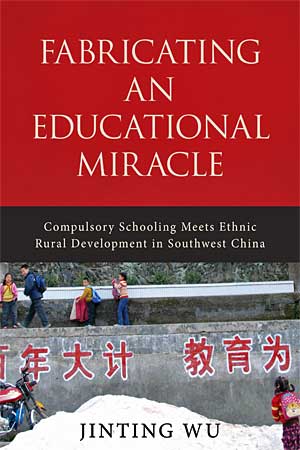
In the media spotlight, ruthlessly dedicated Chinese students and their superb performance in international testing continue to fuel global interest in China’s education system. This, however, tells only a partial story. On the flip side of an educational “China rising” is a vast rural ethnic landscape trapped in educational mediocrity, stagnation, and crisis. This crisis has been deepened by China’s economic boom and optimism about development that offers abundant manufacturing jobs while also enabling a school-to-the-factory pipeline. In scholarship and the popular press, the myth of China’s educational success seems to be quickly fading, as more and more youth find themselves schooled yet prepared only for factory sweatshops.
The book laces together accounts of how compulsory education encounters rural development to produce dilemmas and possibilities in village schools in Southwest China. The study draws upon multi-sited ethnography, oral history, and archival research to investigate conflicts between education policies and modernization agendas in rural China. It starts out with a central puzzle: how do we understand the profound disenchantment and high attrition rates among rural ethnic youth despite the nationwide educational desire for success, despite the state’s relentless efforts to enforce compulsory education, and despite the folk belief in “jumping out of the village gate through academic success?” Reasons behind the disenchanted sentiment are complex, and the book ventures into the domains of policy, audit culture, tourism, labor migration, and people’s contingent life choices (or lack thereof) to highlight the complexity. The volume provides a detailed account of how an educational miracle is fabricated in everyday maneuvers in rural minority schools; and how schooling becomes increasingly penetrated by development programs, audit culture, tourism, and translocal labor migration to produce unintended consequences.
Between 2009 and 2010, I spent 16 months conducting intensive fieldwork in a Miao and a Dong minority village-town in Qiandongnan Prefecture, Guizhou Province. Situated closely above the southwest border of China, Guizhou is a resource-stripped mountain region in China’s hinterlands, where a large number of ethnic minorities reside. Statistically speaking, Guizhou is portrayed in numbers that fetishize rural poverty and underdevelopment. School enrollment rates in the province are also among the nation’s lowest. Alarming dropout rates in the secondary level climbed to a 30% high during the time of this research. With collective anxiety, the Chinese state promotes compulsory basic education through ninth grade and market development to bring social mobility and economic wellbeing to Qiandongnan. Education is perceived as an agent of change, a ticket out of poverty, and a pathway into mobile, prosperous, cosmopolitan citizens. Market is also regarded as a necessary remedy to plug the vast rural base into China’s speedy economic engine.
Yet, as the book shows, compulsory education and rural development programs have brought unintended consequences and become part of the problems they are charged to address. Despite the political slogan, “Today’s education is tomorrow’s economy,” pessimism and ambivalence towards schooling has been growing, culminating in massive rates of attrition among junior secondary students. Many dropouts take up low-end service work as migrant workers and form a new segment of the working class population laboring in China’s coastal cities. With the declining values of credentials and the ever-greater obstacle to “making it” in the exam-focused educational system, motivation to succeed in academics continue to wane. In people’s practical reasoning, they are better off by embracing work as a more realistic path to social mobility.
In recent decades, “ethnic issues” (minzu wenti) and “rural issues” (nongcun wenti) have become focal points of social debates and state policies. With China’s transition from planned economy to market economy, the rural ethnic minorities are increasingly seen as the “holdout” population that needs to be transformed from the national burden to the national asset. Partially moored in the development mantra of contemporary China, Guizhou Province is featured in popular media as the exotic tourism paradise with quaint environment, idyllic scenery, and unsophisticated folk customs. The promotion of rural tourism does to some degree bring the hoped-for economic gains, yet pits local communities against bureaucratic and commercial restrictions. In recent years, ethnic tourism rides the high tide of theme-park-style construction. The attempt of the villagers to renovate or rebuild their own houses can lead to fine, demolition, and even eviction, if the houses are judged incompatible with a traditional architectural idiom that tourism planners aim to preserve. Schools in both villages are forced to evacuate from the village centers, along with other public facilities such as medical clinics and government offices, to make room for commercial ventures. The public good collapses into striking irrelevance against the backdrop of commercial success.
Education and tourism in Qiandongnan are contextually bound. Just as village teachers are increasingly drawn to moonlighting opportunities on the tourism market, tourism also attracts, to the burden of local schools, a higher number of officials, who come to conduct school inspections so that they can also enjoy free-ride tourism. Meanwhile, dropout students are lured by jobs on the tourism market and make a living as souvenir vendors, hotel janitors, and restaurant workers. Tourism becomes a distinct background where individual aspirations, bureaucratic agendas, and commercial interests are entangled in an educational space with declining legitimacy. The theatrical display of manicured landscape in tourism is also seen in the on-stage and off-stage work by school actors, as described below.
It is early May 2009, only a few days before the impending school inspection by the provincial delegate. The Dong village of Longxing has been selected as one of the sites on the delegate’s itinerary, an “unfortunate” event according to the teachers who have grown weary of frequent school audits by different levels of government officials all year long. Both the primary school and middle school (the only two schools in the village) have spent weeks and months preparing for this significant event, as the delegate’s grand tour in the region will declare whether the policy goals of universal basic education have been achieved. In my observation, the preparation entails several interlinked aspects involving school administrators, teachers, and students. Firstly, numerous forms regarding enrollment data need to be carefully doctored, as a 30% dropout rate will decisively invite official sanction and jeopardize the teachers’ and the schools’ future. Secondly, the dilapidated school compounds – in part due to the capricious tourism planning that threatened to take over the schoolyards for commercial purposes and thus delayed the much needed renovation perpetually – are to be carefully groomed to conceal the disrepair. Thirdly, the physical absence of dropout students needs to be filled by substitutes to match the now close to 100% enrollment data on the paperwork. Village schools assign full-time data administrators to prepare various forms and rosters, and deploy the strategies of borrowing students from each other or turning returned migrant workers into one-day students on the inspection day.
On the morning before the delegates arrive, both schools in Longxing cancel classes to enlist students’ labor in the final round of cleaning, mopping, and decorating. Red banners inscribed with welcome messages are hung up on the school walls. Science labs and libraries, rarely used and covered in dust, are wiped spotless. The usually dreary and congested teachers’ offices are freshened with flower bouquets. A steady stream of youngsters arrives to report their attendance; they are either summoned from nearby villages or sent by parents or guardians of dropout students to sit in for the day. A student performance team undertakes one last round of dress rehearsal to get ready for staging their welcome in the evening. Dinner banquets with ethnic specialty dishes and locally brewed rice wine are meticulously arranged. Teachers explain that these days they have to focus more on dinner tables than classrooms. That the student dorms are battered and crumbling, that the playground is dug up and at risk of becoming a tourist parking lot, that students are alarmingly disengaged, that the teachers are demoralized and attended to their job only half-heartedly are inconvenient truths quickly swept under the carpet. What is immediately at stake is the need to fulfill the planned quota (100% grade promotion and zero attrition) as set in the national policy agendas. This form of performance audit has its historical antecedent during the Maoist era when pre-set production quotas dictated local self-reporting. As a legacy of centralized planning, the audit rituals function to demonstrate accountability, yet conceal the painstaking work involved in staging a political spectacle.
Through enforcing compulsory education and promoting rural tourism, the Chinese state joins hands with the market to transform the rural ethnic population into self-entrepreneurial individuals responsible for pulling themselves up by their own bootstraps. Yet in doing so, ironies and unintended consequences abound. As I entered the labyrinth of Southwest China, I marveled at how the manifold and contradictory agendas captured rural ethnic schooling at a crossroads. I observed rural schools in two minority village-towns in Qiandongnan being turned into besieged workplaces, where teachers and students faced daily ordeals of discouraging, disorienting, and even deceitful practices. My ethnographic incursion into the classrooms, school yards, corridors, families, dinner tables, rice fields, and village markets afforded ample opportunities to understand what it was like to live, work, go to school, and drop out of school in a socioeconomically marginalized, ethnically-marked, geographically isolated region in Southwest China. Inside as well as outside schools, factors abound to shape the deeply distressed contour of rural education despite good policy intentions. What I present in this work in a sense resonates with familiar themes increasingly prevalent on a national and even global scale. Rural schooling is the sensitive reflector of larger social processes par excellence and the lens through which I investigate broader issues of school reforms, ethnic politics, migration, citizenship, and globalization, a scope that reaches beyond the immediate case of China.


Jinting Wu (Ph.D., University of Wisconsin-Madison) is Assistant Professor of Educational Culture, Policy and Society at the State University of New York at Buffalo. Her research interests include anthropology of education, comparative and global studies of education, transnational curriculum inquiry, educational theory and philosophy, and schooling and social change in contemporary China and Chinese diaspora. She conducts research in the areas of rural minority education, disability and special education, immigrant youth and families, and educational meritocracy on the global stage. She is the recipient of the 2013 Gail P. Kelly Outstanding Dissertation Award in Comparative Education.